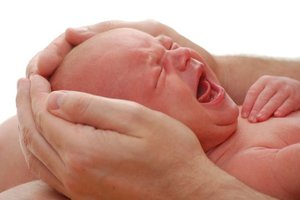- Home
- Editorial
- News
- Practice Guidelines
- Anesthesiology Guidelines
- Cancer Guidelines
- Cardiac Sciences Guidelines
- Critical Care Guidelines
- Dentistry Guidelines
- Dermatology Guidelines
- Diabetes and Endo Guidelines
- Diagnostics Guidelines
- ENT Guidelines
- Featured Practice Guidelines
- Gastroenterology Guidelines
- Geriatrics Guidelines
- Medicine Guidelines
- Nephrology Guidelines
- Neurosciences Guidelines
- Obs and Gynae Guidelines
- Ophthalmology Guidelines
- Orthopaedics Guidelines
- Paediatrics Guidelines
- Psychiatry Guidelines
- Pulmonology Guidelines
- Radiology Guidelines
- Surgery Guidelines
- Urology Guidelines
Maternal migraine increases risk for colic in infants

Delhi: Mothers with migraine are more likely to have colic babies, suggests a recent study presented at the American Headache Society (AHS) Annual Meeting 2019. Interestingly, paternal migraine was not linked to infant colic or excessive crying in an otherwise healthy infant.
"Infants 4-8 weeks old were 70% more likely to be colic when born to mums having migraine compared to babies born to women not having a migraine," said lead author Dr Amy Gelfand, director of paediatric headache research at the University of California, San Francisco, US, at the conference. "Mothers having migraine were 1.7 times more likely to have infant colic."
“There was a clear association no matter how we asked about migraine … and it opens up a door for us to think what migraine really looks like in the developing brain,” said Gelfand. “Are these babies having a migraine or experiencing distress, and expressing it in the only way they can?”
For the study, the researchers analyzed 1,149 online responses from 827 mother (33.5% of whom had migraine or probable migraine) and 592 fathers (20.8% of whom had migraine or probable migraine).
The question asked was “Has your baby cried for at least 3 hours at least three times in the past week?” Twenty-six per cent of babies met this criterion for colic.
Also Read: No maternal diet modification helps in infantile colic
Key findings include:
- Mothers with migraine were 1.7 times more likely to have babies with colic.
- Paternal migraines were not associated with higher odds for infant colic. A total of 19% of fathers reported migraines.
- Dads with depression or anxiety were more likely to have a baby with colic.
- Aside from the maternal migraine-infant colic link, the researchers noted a dose-effect. Mums who had migraine 15 days or more each month were more likely to have a colicky baby, but not the dads.
Also Read: Consumption of more than 3 cups of coffee a day may trigger migraine attack
While infant colic is often assumed to be due to abdominal discomfort, there is limited evidence to support gastrointestinal aetiology, said Gelfand. X-rays in a small number of studies have shown no extra-abdominal gas and that the antiflatulent simethicone does not seem to improve the condition. Feeding by breast or bottle also does not seem to have any correlation with infant colic.
Colicky crying peaks at 5-6 weeks post gestational age, hence it could be something that involves neuronal maturation, Gelfand said. “Colic could be a brain-driven process rather than a belly-driven process.”
If infant colic is an early-life manifestation of migrainous tendencies, Gelfand said this would have significant implications for treatment.
“This is a tremendous opportunity moving forward,” she said. “Further research is needed. In the meantime, it offers an opportunity for counselling … we now know women with a history of migraine have an increased likelihood of having a colicky infant. Hence, clinicians may wish to provide resources and education on how to manage infant colic.”

Disclaimer: This site is primarily intended for healthcare professionals. Any content/information on this website does not replace the advice of medical and/or health professionals and should not be construed as medical/diagnostic advice/endorsement or prescription. Use of this site is subject to our terms of use, privacy policy, advertisement policy. © 2020 Minerva Medical Treatment Pvt Ltd